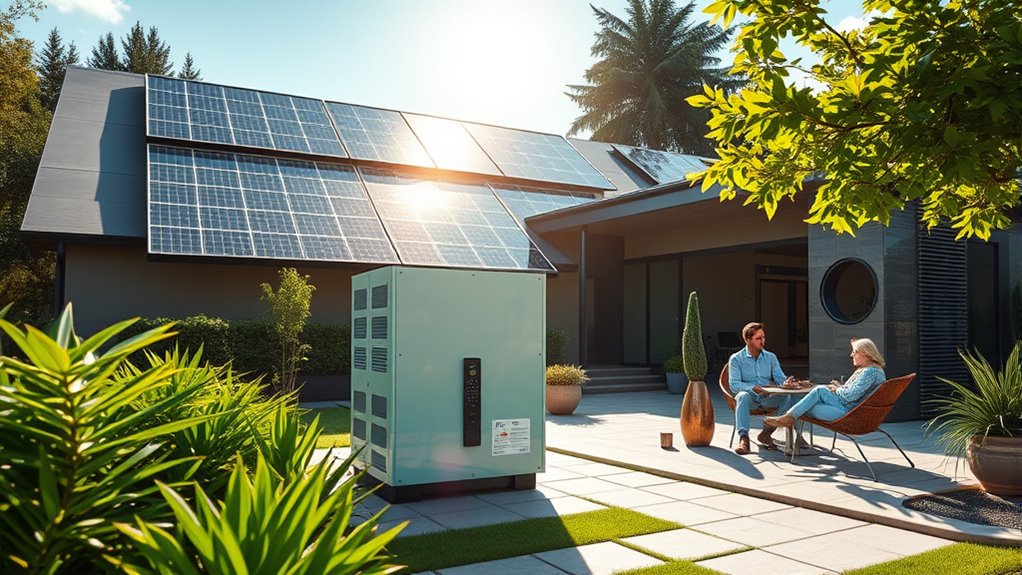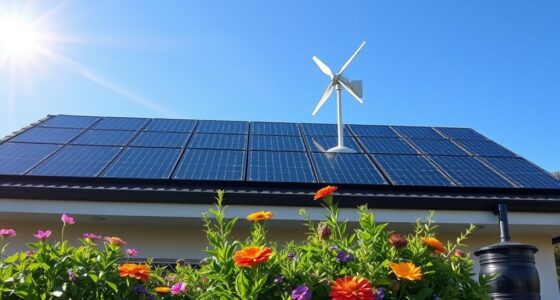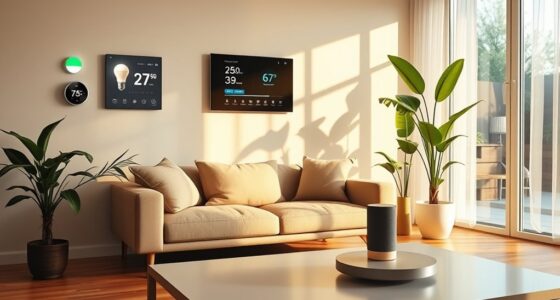If you're looking for the best energy storage solutions for your home, consider lithium-ion batteries for their efficiency and longevity. Pair these with smart energy management systems to optimize usage and lower costs. Thermal energy storage is another great option, especially for heating and cooling needs. Modular designs are perfect for scalability as your energy needs grow. If you want to explore additional technologies and market trends that can enhance your energy independence, stay with us.
Key Takeaways
- Lithium-ion batteries are the most efficient and durable choice for home energy storage, providing high energy density and long lifespan.
- Integrating solar energy systems allows homeowners to store excess energy for later use, reducing reliance on the grid and lowering electricity bills.
- Smart management software optimizes energy use, enabling homeowners to understand consumption patterns and maximize the benefits of their storage systems.
- Modular designs offer scalability, allowing homeowners to expand their energy storage solutions as needs grow while maintaining lower operational costs.
- Emerging technologies like solid-state batteries promise higher capacities and affordability, making them a future consideration for home energy storage solutions.
Top Energy Storage Options for Homeowners
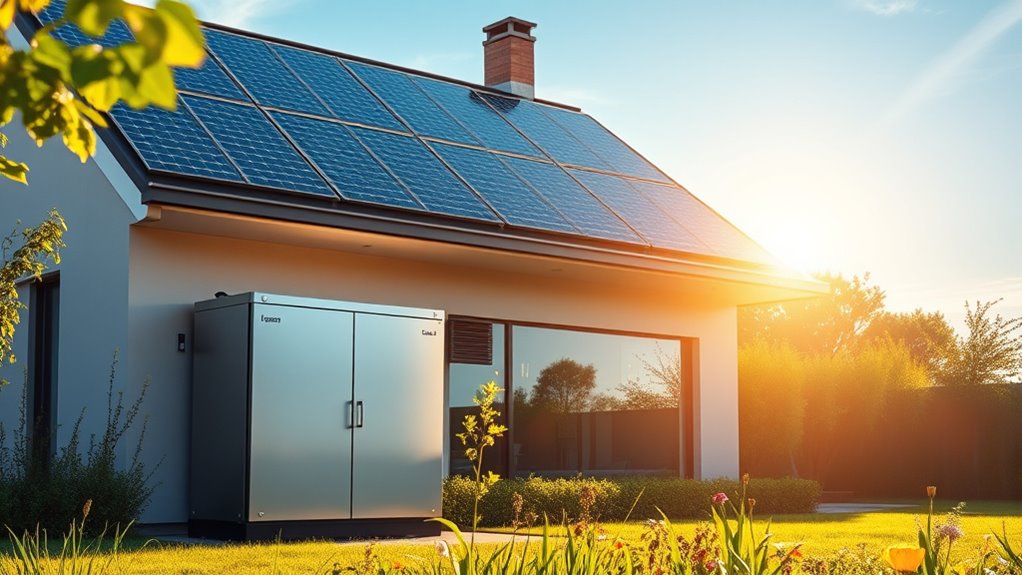
When considering energy storage options for your home, you'll find a variety of solutions tailored to different needs and budgets.
Lithium-ion batteries are a popular choice due to their high energy density and long lifespan, making them ideal for residential use. If you're looking for something more cost-effective, lead-acid batteries might suit off-grid systems, though they're less efficient. Additionally, many homeowners are now exploring solar energy solutions that can be paired with storage systems to maximize efficiency. Integrating heat pumps into your energy system can also enhance overall efficiency and comfort levels in your home, as they offer efficient home heating and cooling solutions that can significantly lower energy bills. Using wood stoves for supplemental heating can further reduce reliance on traditional energy sources and improve your home's eco-friendliness.
Thermal energy storage can help with heating and cooling needs, while flywheel energy storage uses kinetic motion for energy retention. Alternatively, hydrogen storage allows you to convert excess energy into hydrogen for future use.
Each option has unique benefits, so assessing your specific requirements will help you make the best choice for your home. Additionally, integrating these systems with personalized learning pathways can enhance your understanding of energy management and efficiency.
Key Features to Consider
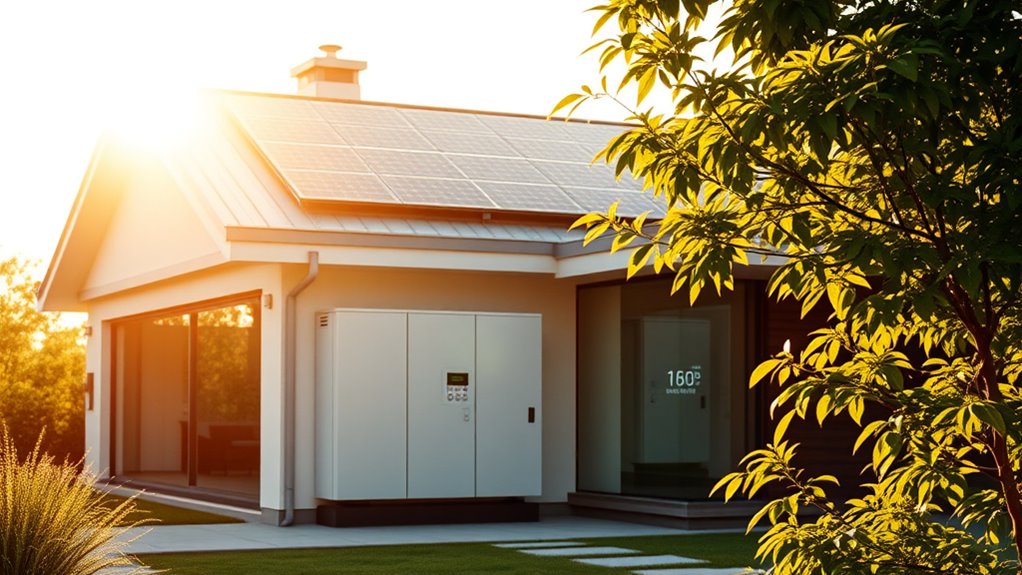
Choosing the right energy storage solution involves more than just comparing types and costs; you also need to consider key features that can significantly impact your experience and efficiency.
First, look at the battery type—lithium-ion is often preferred for its longevity and efficiency. Smart management software can optimize energy use, making your system more efficient. Additionally, understanding energy consumption patterns helps in maximizing the benefits of your energy storage system. Moreover, incorporating solar charge controllers can further enhance the performance of your energy storage setup. Having a good understanding of color accuracy can also help in ensuring that your system operates effectively under varying conditions. Furthermore, integrating smart utilities can improve your energy management and reduce overall consumption.
Ease of setup and installation is crucial; plug-and-play designs save time and hassle. Scalability is another feature to consider, allowing you to expand your system as your energy needs grow.
Lastly, ensure compatibility with your existing smart home systems for seamless integration. These features can enhance your energy independence and overall satisfaction with your energy storage solution. Additionally, consider how hydrogen fuel cells can provide a sustainable alternative for energy storage in the future.
Advantages of Modular Designs
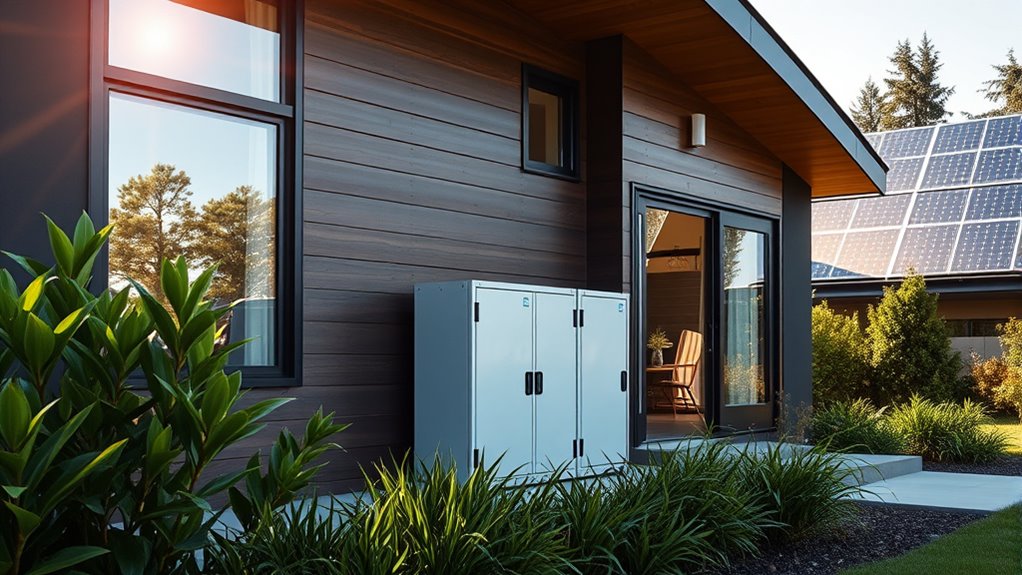
Modular designs offer significant advantages for homeowners looking to optimize their energy storage solutions.
First, they provide scalability and adaptability, allowing you to expand your system by adding modules as your energy needs grow. This flexibility helps manage peak demand and boosts energy efficiency by reducing waste. Additionally, heat pumps can complement these systems by providing efficient heating and cooling, further enhancing overall performance. Furthermore, commercial grade heat pumps are designed to handle larger heating and cooling loads, making them suitable for various applications. The integration of advanced technology in modern heat pumps can lead to improved temperature regulation and overall system efficiency. Understanding the state tax implications of energy investments can also influence your decision-making process.
You'll also find that modular systems can lower operational costs and enhance reliability, ensuring stable backup power during outages.
Their versatility means you can use them in various settings, whether residential or commercial.
Plus, modular designs require less space and facilitate easy installation and upgrades. Additionally, heat pumps filter and circulate indoor air, which can further improve the overall performance of energy systems in the home.
Integration With Solar Energy Systems
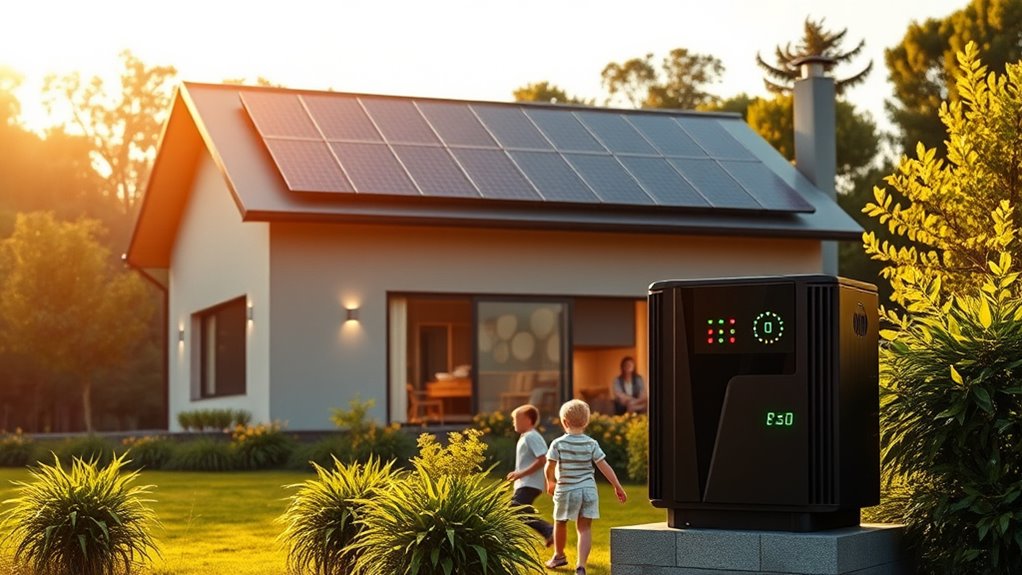
Integrating energy storage solutions with solar energy systems creates a powerful combination that enhances your home's energy management.
With solar panels converting sunlight into electricity, you can store excess energy in batteries for later use. This setup not only reduces your reliance on the grid but also provides backup power during outages, ensuring a continuous energy supply. Furthermore, advancements in renewable energy technologies are continuously increasing the efficiency of solar panels, allowing for more energy capture and storage. Additionally, understanding local regulatory frameworks can help you navigate potential incentives for integrating these technologies. Regular maintenance of these systems can significantly improve their performance and lifespan, ensuring optimal energy efficiency. Moreover, embracing the power of imagination in designing your energy solutions can lead to innovative approaches that maximize your energy independence.
Plus, using stored energy during peak hours minimizes your electricity bills. Smart energy management systems optimize production and consumption, contributing to grid stability by balancing supply and demand.
As you make the shift to solar plus storage, you'll enjoy increased property value and a smaller carbon footprint, making your home more efficient and environmentally friendly. Moreover, by combining these systems with energy-efficient technologies, you can further enhance your overall energy savings and reduce operational costs.
Advanced Technologies in Energy Storage
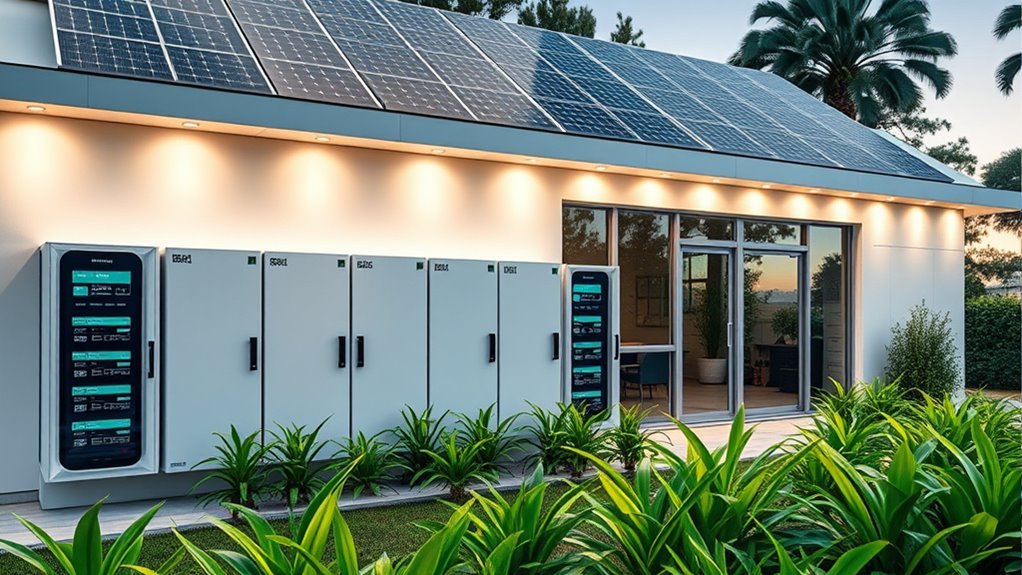
As innovations in energy storage continue to evolve, homeowners can benefit from advanced technologies that enhance efficiency and reliability.
Lithium-ion batteries remain the dominant choice, but solid-state and sodium-ion batteries are paving the way for higher capacities and lower costs. Smart shopping tips can help you find the best deals on these advanced technologies. Additionally, plant-based sources of omega-3s, like chia seeds, offer nutritional benefits that can support overall health while you manage your energy consumption. Chia seeds are particularly beneficial due to their high fiber content, which aids in digestion and promotes feelings of fullness. Furthermore, understanding risk management strategies can help you make informed decisions about your energy investments.
You might also consider hydrogen storage, which converts excess electricity into hydrogen for future use.
Compressed air energy storage and thermal energy storage provide alternative methods for managing energy.
Supercapacitors offer quick power bursts, while smart inverters and energy management systems optimize your energy use. Battery-less inverters can be a cost-effective solution for homes with consistent energy consumption patterns, further enhancing your energy management.
With IoT integration, you can monitor and manage your system in real-time, ensuring you get the most out of your energy storage solution, ultimately reducing costs and environmental impact.
Market Trends in Energy Storage Solutions
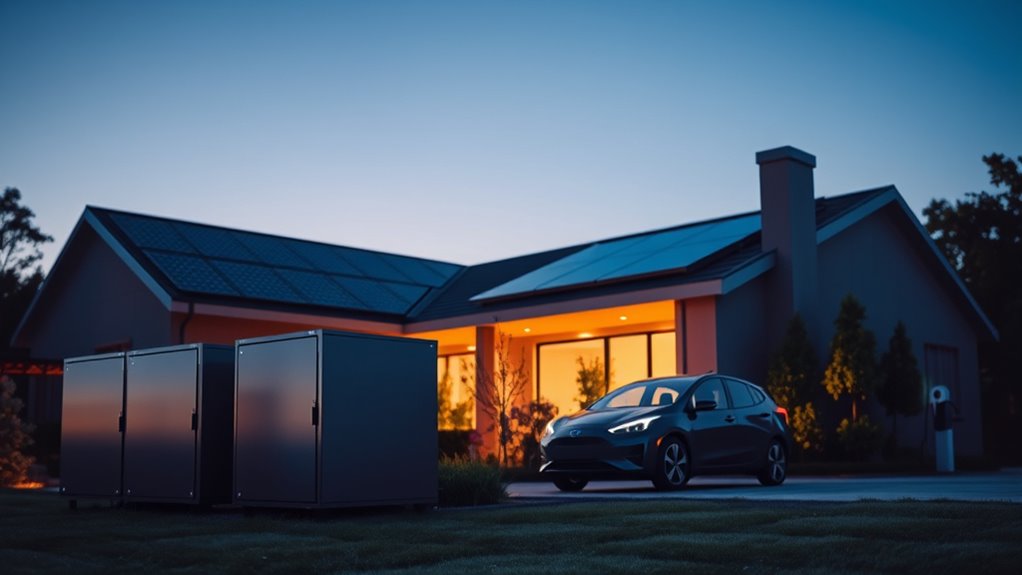
With the energy storage market rapidly evolving, homeowners are witnessing a surge in innovative solutions that enhance both efficiency and affordability.
The global energy storage systems market is projected to grow significantly, reaching USD 668.7 billion in 2024 and expanding at a CAGR of 21.7% through 2034. This growth is influenced by rising tensions among major powers, which has led to a greater focus on energy independence and sustainability. Furthermore, data-driven marketing strategies can help consumers make informed purchasing decisions in this expanding market.
Notably, the residential energy storage market is expected to rise from USD 2.67 billion in 2024 to USD 4.30 billion by 2030. This growth parallels the increasing demand for professionals in various tech sectors, including energy management and sustainability. Understanding investment regulations for energy storage can further encourage homeowners to make informed choices about their systems.
Lithium-ion batteries dominate residential solutions due to their efficiency, while emerging technologies like solid-state and flow batteries are gaining traction. As global inflation rates impact consumer purchasing power, affordability becomes a key consideration for homeowners investing in energy storage.
With government incentives, like tax credits and subsidies, homeowners are increasingly turning to energy storage systems, integrating them with home automation for smarter energy management. This shift aligns with the growing demand for transparency in energy solutions, as consumers seek clarity on the sustainability and efficiency of their investments.
Recommendations for Optimal Energy Storage
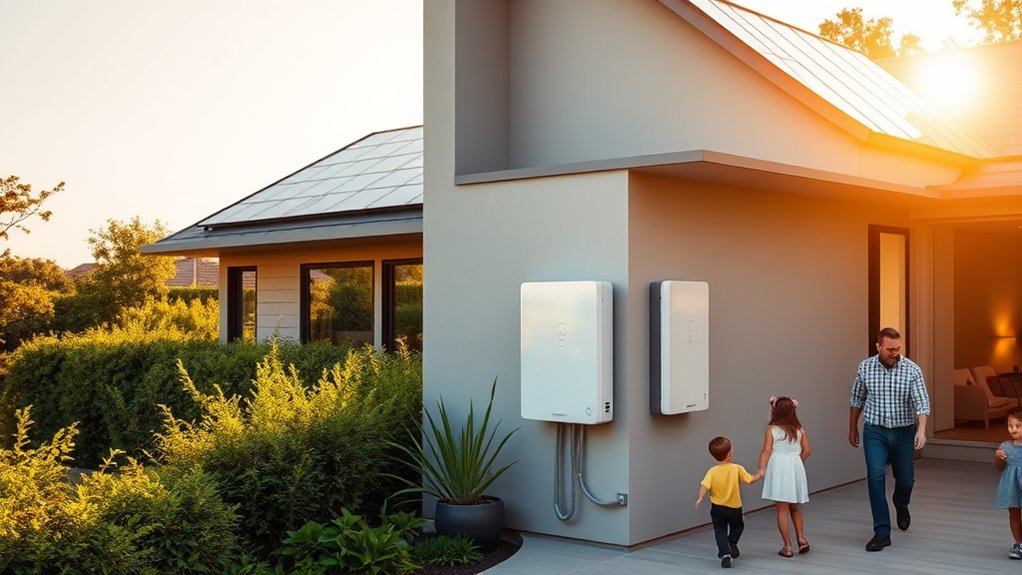
To achieve the best results from your home energy storage system, it's essential to consider several key factors.
First, assess your energy needs to determine the right storage capacity. If you have solar panels, ensure your system integrates smoothly with them.
Opt for lithium-ion batteries for their efficiency and longevity. Look for hybrid inverters that enhance energy management and support grid stability.
Modular designs offer flexibility, allowing expansion as your needs grow. Implement smart monitoring and energy management software to optimize usage patterns.
Finally, keep an eye on system maintenance to ensure peak performance.
Frequently Asked Questions
How Do Energy Storage Systems Affect Home Insurance Rates?
Energy storage systems can impact your home insurance rates, often requiring policy adjustments or endorsements.
While most standard homeowners' policies cover such systems, you might need extra coverage for comprehensive protection, which could raise your premiums.
The increased value of your home from installing these systems may also necessitate higher coverage limits.
It's essential to discuss your specific needs with your insurer to ensure you're adequately protected without unexpected costs.
What Are the Typical Installation Costs for Home Battery Systems?
Installing a home battery system's like buying a car; it comes with various costs.
You'll typically spend between $8,000 and $16,000 for installation, depending on your system's size and complexity. Labor costs range from $2,000 to $8,000, and you can expect an additional $500 to $2,000 for permits and inspections.
Can Energy Storage Systems Be Used During Power Outages?
Yes, energy storage systems can be a lifesaver during power outages. They automatically switch to battery power when the grid fails, ensuring your essential appliances keep running.
By storing energy from the grid or renewable sources, these systems provide backup power, reducing disruptions.
Plus, if you have solar panels, they can recharge even during an outage. This way, you maintain power continuity without any hassle, keeping your home functional when you need it most.
How Long Do Energy Storage Batteries Typically Last?
Energy storage batteries can last longer than your favorite pair of sneakers—typically between 10 to 15 years!
If you've got lithium-ion batteries, you're in luck; they outlast lead-acid types by a mile.
Factors like how you use them and the temperature they live in can influence their lifespan.
When they drop to about 70% capacity, it's time for a change, but with good care, they'll stick around for years!
Are There Government Incentives for Installing Energy Storage Systems?
Yes, there are government incentives for installing energy storage systems.
You can benefit from federal tax credits offering 30% off installation costs until 2035. Many states also provide rebates to encourage adoption, like California and New York.
These incentives not only reduce your upfront costs but also support your energy independence and resilience during outages.
It's a great opportunity to maximize savings while investing in sustainable energy solutions for your home.
Conclusion
Incorporating the right energy storage solution for your home can be as transformative as planting a seed and watching it grow into a thriving tree. By understanding the various options, key features, and market trends, you can make an informed choice that suits your needs. Embracing advanced technologies and modular designs allows for seamless integration with solar systems, ensuring you harness every ray of sunshine. Take the leap towards energy independence and sustainability today!
